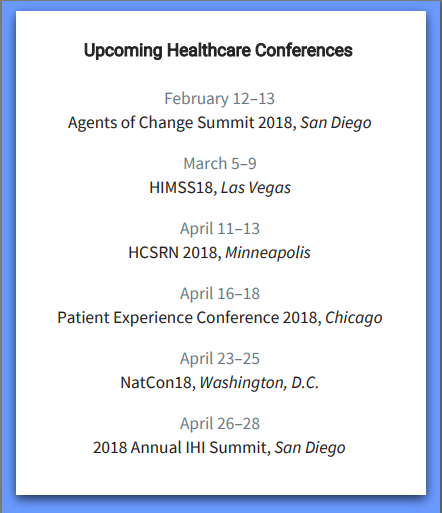Cara Benson, Community Manager at Eventbrite, has some valuable insights to share on the power of healthcare events and other healthcare marketing strategies. Here are a few tactics she suggests trying in 2018.
At the end of December, Formstack discussed how the current state of patient engagement requires a turn toward mobile healthcare solutions. Similarly, the ways hospitals engage with their communities and promote their services to the public must also evolve if institutions wish to stay competitive. According to Patrick Buckley, a U.S. healthcare marketing expert, marketing is a non-negotiable for hospitals and healthcare networks. However, “most hospitals in the U.S. still spend less than one percent of their total operating revenues on marketing.”According to Buckley, “hospitals and health systems are continually affected by external forces over which they have no control.” These forces include politics, changes in government regulations, declines in reimbursement, the growth of alternative medicine, and the rise of consumerism. The 2008 global financial crisis and the introduction of the Affordable Care Act are two specific examples.The solution? Marketing is one reliable way that healthcare networks and hospitals can exhibit more control over patient flows in such a volatile environment.
Harness the Power of Events
For most businesses, event marketing is a worthwhile investment. One study found that 74% of respondents were more likely to become a patron after attending an event.However, event marketing poses a significant challenge for hospitals and healthcare networks. People aren’t exactly eager to see what’s new at their local hospital. Essentially, hospitals must market to “customers” who try their best to avoid hospitals. However, with the right tools and strategies, event marketing can help you connect with the local patient community and differentiate your facility from the competition.Here are some healthcare event marketing tactics you might consider:
- Hold free local classes and workshops to teach the community about healthy living, managing illness, and understanding healthcare options.
- Partner with local businesses and host on-site Q&As.
- Host galas and fundraisers that support growing your donor and sponsor network.
- Present at conferences and summits to share recent research and breakthroughs, positioning your network or hospital as a global industry leader. (See list of upcoming conferences below.)

Besides the event itself, the most critical piece of the event marketing puzzle is promoting the event in strategic ways. Since the patient consumer base is now largely mobile, the best way to promote your event is by leveraging a number of online strategies. According to Eventbrite, the first four steps of your online event promotion strategy should include keyword targeting, email marketing, an enticing event page, and an ironclad social media program.But before you can implement a successful online promotion strategy, you must first establish an authoritative and reliable online presence.
Maintain an Online Presence
Recent studies have shown that 80% of Americans have searched for a health-related topic online. Other studies have found that most patients visit a hospital website before booking an appointment, and many say that content found on social media will likely impact their choice of hospital or treatment center.Don’t just focus on what Buckley calls “vanilla” campaigns (advertising only advanced technology) or soley promoting your events. Publish content that harps on what matters most to patients: quality, safety, and trustworthy health-related information.No matter your content marketing strategy, prioritize a clear, quality user experience for your desktop and mobile website and any affiliated online properties. Improving user experience might include hosting a series of mobile online forms to make it easier for patients to access their healthcare information and for you to collect feedback to help improve overall patient experience.The CDC also strongly recommends that members of the healthcare community use social media as an engagement tool. Savvy healthcare marketers should tap into social media to foster new relationships and strengthen current ones by doing the following:
- Educating communities that are not adequately reached
- Offering useful content where consumers spend their time
- Facilitating real-time conversations
- Improving credibility and though leadership
The WHO has also joined the conversation, further endorsing the use of social media to spread information. Additionally, social media management platform Hootsuite and healthcare giant the Mayo Clinic have been working together since 2015 to educate healthcare professionals on the power and importance of social media.
Keep Up to Date on Trends
Internet search and social media have all but replaced the traditional ways patients conduct health-related research, transforming the patient path to treatment. While healthcare marketers have responded with minor adjustments to their strategies, they are still lagging behind technology. To stay competitive and ensure a steady intake of new patients, healthcare organizations must first make consumer market research a priority.Keeping up to date with the latest digital trends, tools and software, and consumer preferences will help inform all marketing strategy decisions and shape impactful campaigns and events. For example, knowing that many consumers are using search engines to research symptoms and treatments, you might deploy a content marketing strategy that aims to help patients find the best information on common conditions using your site. Staying on top of this type of information will help you find new ways to get in front of the people who matter most with the kinds of content and experiences they actually want to see.
About the Author
Cara Benson is the Community Manager at Eventbrite, the world's largest event technology platform.
Are you looking to participate in a healthcare conference this year? Formstack will be at HIMSS18! Click below to learn more.










